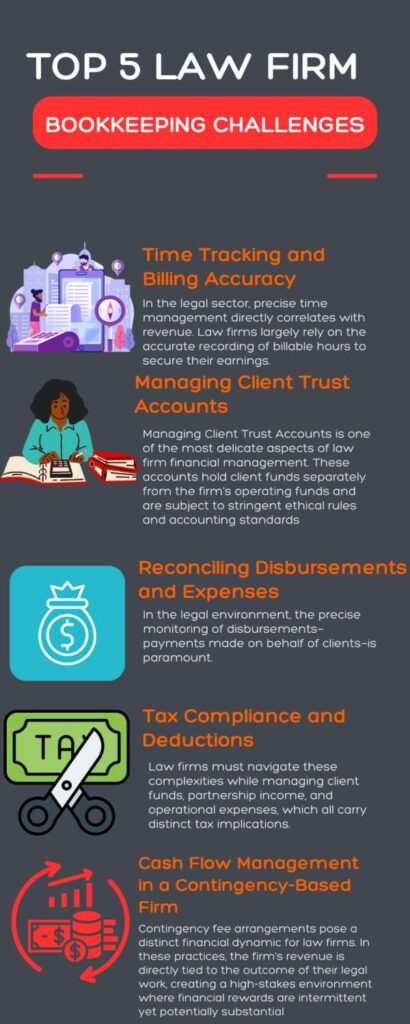
Top 5 Law Firm Bookkeeping Challenges and How to Overcome Them – Papillon House

Managing the books for a law firm comes with a unique set of challenges that can perplex even the most seasoned of bookkeepers. Balancing the complexities of legal accounting with the precision required for financial clarity is no small feat. Within the legal industry, these challenges are magnified by the need for compliance, ethical client fund management, and a highly competitive market that demands fiscal efficiency.
For those tasked with managing the ledgers and financial statements, it’s more than just a job—it’s a careful act of balance and precision. The stakes are high; a single misplaced decimal can disrupt the harmony of a firm’s finances, much like a misinterpreted law can alter the course of a trial. The unique financial challenges that law firms face are often a silent symphony of complexities that bookkeepers conduct with meticulous attention to detail and a deep sense of responsibility.
Embracing the sensitivity of this role, this post aims to provide a compass to navigate the top five bookkeeping challenges that law firms encounter. It’s not just about staying in the black or red—it’s about crafting a financial narrative that echoes the firm’s commitment to justice and its promise of professionalism to every client that walks through its doors.
Key Takeaways
- Law firms face unique financial challenges due to their complex billing structures, the need to manage client funds ethically in trust accounts, and compliance with specific legal industry regulations.
- Accurate time tracking and billing are crucial for law firm revenue, requiring advanced timekeeping software and regular invoicing cycles to avoid errors and maintain transparency with clients.
- Effective cash flow management is essential, especially for firms that work on a contingency basis, necessitating diversified practice areas, financial reserves, and careful monitoring of case-related expenses.
Understanding the Unique Financial Needs of Law Firms
The Dynamics of Client Relations: At the heart of any law firm is its relationship with clients. Unlike most businesses where services or products are exchanged for money and the transaction is concluded, law firms have ongoing relationships with their clients. This often involves handling clients’ funds, either as retainer fees or in trust, which demands a higher degree of financial accountability.
Billable Hours and Flat Fee Structures: Law firms predominantly use the billable hours’ model, where clients are billed based on the time the attorney spends on their case. This requires careful tracking of time and activities. On the other hand, some law firms might opt for a flat fee structure for specific services. Both models come with their own set of challenges in recording, billing, and ensuring that all financial entries align with the work done.
Handling Client Trust Accounts: One of the critical responsibilities for many law firms is the management of client trust accounts (or IOLTA accounts in the U.S.). These are accounts where client funds are held until they are used for case-related expenses. Mistakes in managing these accounts can not only harm the firm’s reputation but also lead to legal penalties.
Variable Cash Flow: The nature of legal cases means that cash flow can be unpredictable. A firm might take on a contingency case where they only get paid if they win, leading to periods of low income followed by a significant inflow of cash. This variability requires solid financial planning.
Regulatory Compliance: Law firms are subjected to various regulations, especially concerning financial transactions and client money handling. Non-compliance isn’t just a financial risk; it’s a reputational one. Proper bookkeeping practices must adhere to all regulatory requirements to ensure the firm remains in good standing.

Challenge 1: Time Tracking and Billing Accuracy
In the legal sector, precise time management directly correlates with revenue. Law firms largely rely on the accurate recording of billable hours to secure their earnings. When time tracking is flawed, it doesn’t just result in minor discrepancies; it causes a ripple effect that can lead to significant financial shortfall. Hence, it is essential for a firm’s prosperity that the hour’s attorneys invest in various cases are accounted for with utmost accuracy. This ensures that the firm not only safeguards its revenue but also upholds the professional standards expected by its clients.
Roots of the Issue:
Fragmented Tracking: Lawyers often juggle multiple cases simultaneously, leading to sporadic work patterns. Tracking time accurately across various tasks becomes a challenge, especially if done manually.
Human Error: Manual entries can lead to overestimations, underestimations, or complete omissions of billable hours.
Inconsistent Billing Descriptions: Vague descriptions can lead to confusion and may give clients the impression of non-transparency or overbilling.
Delayed Invoicing: The longer the gap between the work performed and invoicing, the harder it becomes to recall specific tasks, leading to potential inaccuracies.
Best Practices for Precise Timekeeping:
Adopt Specialized Timekeeping Software: Invest in legal-specific time-tracking tools that allow lawyers to start and stop timers as they switch between tasks. This software often integrates with case management systems, ensuring that every minute spent on a case is accounted for.
Regularly Review and Approve Time Entries: Encourage attorneys to review their time entries at the end of each day or week.
Standardize Billing Descriptions: Implement a firm-wide standard for billing descriptions, ensuring clarity and consistency. Detailed, transparent descriptions increase client trust.
Set Regular Invoicing Cycles: Avoid letting billable hours accumulate. Instead, set a regular invoicing cycle, whether it’s weekly, bi-weekly, or monthly.
Training and Workshops: Regularly conduct internal workshops or training sessions for attorneys on the importance of accurate timekeeping. Highlight the financial and reputational implications of inaccuracies.
Implement Time Audits: Periodically audit time entries for accuracy and consistency. This not only identifies potential issues but also deters casual or inaccurate logging of hours.
Client Feedback: Encourage clients to provide feedback on invoices.
Challenge 2: Managing Client Trust Accounts
Managing Client Trust Accounts is one of the most delicate aspects of law firm financial management. These accounts hold client funds separately from the firm’s operating funds and are subject to stringent ethical rules and accounting standards.
The fiduciary responsibility held by law firms in handling these accounts is profound. Every dollar must be tracked with precision to ensure not only legal compliance but also to maintain the trust and confidence of clients. The accurate administration of these accounts is a testament to a law firm’s integrity and commitment to upholding the legal profession’s high standards.
Roots of the Issue:
Commingling of Funds: One of the most common issues is the mixing of client funds with the firm’s operating funds.
Inaccurate Record-Keeping: Failure to maintain detailed records for each client’s funds can result in discrepancies that are difficult to reconcile.
Delayed Disbursements: Holding onto client funds longer than necessary, especially after the case has concluded or expenses have been settled, can create mistrust.
Insufficient Funds: Drawing from one client’s funds to cover another client’s expenses is not only unethical but can lead to legal repercussions.
Best Practices for Managing Client Trust Accounts
Separate Trust from Operating Accounts: Always maintain distinct accounts for client funds and the firm’s operational funds. This ensures no unintentional mingling occurs.
Detailed Ledger for Each Client: Every client should have a separate ledger detailing every transaction—deposits, disbursements, and adjustments.
Regular Reconciliation: Periodically (at least monthly), reconcile the trust accounts, comparing the bank’s records with the firm’s ledgers.
Use Trust Accounting Software: Invest in software designed specifically for managing client trust accounts.
Immediate Disbursement: Once expenses are cleared or cases are concluded, ensure prompt disbursement of any remaining funds back to the client.
Ethical Training: Regularly train all staff members, especially those handling finances, on the ethical considerations and legal standards surrounding client trust accounts.
Avoiding Negative Balances: Ensure that disbursements for a particular client are made only from that client’s balance, never allowing the balance to go negative.
Engage in Periodic Audits: Engaging in internal or third-party audits of trust accounts ensures an extra layer of scrutiny, which can deter errors or unethical practices.
Challenge 3: Reconciling Disbursements and Expenses
Reconciliation stands as a pillar of sound financial management within any enterprise, yet for law firms, this task is underscored by exceptionally high stakes. In the legal environment, the precise monitoring of disbursements—payments made on behalf of clients—is paramount. These outlays, ranging from filing fees to expenses incurred during litigation, require an exacting level of scrutiny.
For a law firm, the imperative extends beyond mere accuracy. Each disbursement must be carefully documented and allocated to ensure that it’s reflected correctly on client invoices.
Roots of the Issue:
Lack of Clarity: Without clear delineation, disbursements can sometimes be confused with general firm expenses, leading to inaccurate client billing.
Delayed Record-Keeping: Procrastinating on logging disbursements and expenses can result in forgetfulness or oversight, causing discrepancies during reconciliation.
Vague Descriptions: Non-specific categorization or descriptions can make it challenging to determine the nature and purpose of certain expenses.
Inconsistent Tracking Systems: Using multiple systems or methods for tracking expenses and disbursements can lead to inconsistencies and missed entries.
Effective Strategies for Reconciling Disbursements and Expenses
Centralized Tracking System: Adopt a unified system or software solution that tracks both disbursements and firm expenses.
Immediate Entry Policy: Implement a policy where all disbursements and expenses are logged immediately upon occurrence. This not only reduces the chances of omission but also ensures accurate descriptions while details are still fresh in mind.
Categorization: Categorize expenses diligently. Whether they are disbursements related to client cases, operational costs, or capital expenses, proper categorization aids in accurate reconciliation.
Regular Reconciliation Sessions: Dedicate regular intervals, such as weekly or bi-weekly, for reconciliation.
Clear Documentation: Always obtain and store receipts, invoices, or any other documentation for disbursements and expenses.
Budget Monitoring: Regularly compare actual expenses against budgeted amounts. This not only aids in reconciliation but also provides insights into the firm’s financial health and areas of potential cost-saving.
Staff Training: Educate staff, especially those handling finances, on the importance of accurate expense tracking. Regular workshops or refresher courses can ensure everyone is on the same page.
Audit Trails: Use software that provides audit trails, showing who made which entries and when.
Challenge 4: Tax Compliance and Deductions
Law firms must navigate these complexities while managing client funds, partnership income, and operational expenses, which all carry distinct tax implications. The added layer of varying tax treatments for different types of legal entities—be it a sole proprietorship, partnership, or corporation—further complicates the tax preparation and filing process.
Roots of the Issue:
Complex Revenue Streams: With various billing methods (hourly, contingency, flat-fee), as well as retainer agreements and trust accounts, revenue recognition for law firms can be complicated.
Overlooking Deductible Expenses: Law firms often miss out on claiming valid deductions due to a lack of documentation or knowledge about what’s deductible.
Frequent Tax Law Changes: Tax codes and regulations evolve regularly, making it challenging for firms to stay updated and compliant.
Inadequate Financial Records: Incomplete or poorly maintained financial records can hinder accurate tax filing.
Effective Strategies for Tax Compliance and Deductions
Engage in Specialized Legal Accounting: Consider working with accountants or CPAs who specialize in legal practices.
Stay Updated on Tax Law Changes: Regularly attend tax seminars, workshops, or webinars that focus on changes in tax regulations.
Implement Comprehensive Bookkeeping: Maintain detailed financial records, ensuring that every expense, disbursement, and revenue is logged and categorized accurately.
Utilize Tax Software: Invest in tax preparation and compliance software tailored for law practices.
Document Everything: From office supplies to professional development costs, keep receipts and documentation for all expenses.
Periodic Tax Reviews: Instead of waiting for the year-end, engage in periodic tax reviews throughout the year.
Understand Trust Account Implications: It’s essential to recognize the tax implications of client trust accounts. Ensure that funds in these accounts are not mistakenly reported as the firm’s income.
Seek Expert Advice on Complex Issues: For complex matters like mergers, acquisitions, or complex financial transactions, consult with tax attorneys or expert CPAs to ensure all tax implications are adequately addressed.
Challenge 5: Cash Flow Management in a Contingency-Based Firm
Contingency fee arrangements pose a distinct financial dynamic for law firms. In these practices, the firm’s revenue is directly tied to the outcome of its legal work, creating a high-stakes environment where financial rewards are intermittent yet potentially substantial.
The challenge here lies in managing the ebb and flow of cash availability. Law firms operating on contingency must exercise heightened foresight in their financial planning, as regular expenses—such as salaries, office overheads, and third-party fees—persist regardless of case outcomes
Roots of the Issue:
Unpredictable Income Streams: Since income is tied to case outcomes, there’s inherent uncertainty in when and how much a firm will be paid.
Extended Case Durations: Some cases can span years before reaching a conclusion, leading to prolonged revenue droughts.
Variable Case Expenses: The costs associated with litigating cases (e.g., expert witnesses, research, travel) can vary widely and may accrue before any income is realized.
Potential for No Payment: If a case is lost, the firm might receive no payment, despite having invested time and resources.
Expert Tips for Maintaining Steady Cash Flow:
Diversify Practice Areas: While specializing is beneficial, diversifying into multiple practice areas can bring in varied cases, some of which might have shorter durations or non-contingency payment models.
Maintain a Financial Cushion: Set aside a portion of earnings during lucrative periods to create a financial buffer. This reserve can sustain the firm during dry spells or when awaiting case settlements.
Monitor Case Expenses Closely: Regularly review and approve expenses associated with cases. While it’s essential to invest in a case’s success, it’s equally crucial to ensure expenses are justified and controlled.
Cash Flow Forecasting: Engage in regular cash flow forecasting, projecting income and expenses based on the current caseload, historical data, and potential outcomes.
Flexible Staffing Solutions: Consider flexible staffing models, such as contract attorneys or part-time experts, which can be scaled up or down based on caseload and financial health.
Negotiate Payment Terms: For expenses like expert witness fees or external research, negotiate favorable payment terms, such as deferred payments or instalment plans, to ease immediate financial burdens.
Regular Financial Reviews: Conduct monthly or quarterly financial reviews, assessing cash flow status, upcoming expenses, and projected income.
Consider Alternative Revenue Models: While the core might be contingency-based, explore additional revenue streams, such as consultations, speaking engagements, or retainer models for specific clients or cases.

Boost Your Practice with Expert Financial Management from Papillon House
Is your law firm’s potential constrained by the complexities of financial management? At Papillon House, we understand that legal expertise—not ledger lines—should command your focus.
Choose Papillon House and experience the pinnacle of bookkeeping proficiency. Entrust your tax management, payroll, bill tracking, and book maintenance to us. Partner with Papillon House—where your firm’s financial health is our highest mission
From the fine-tuning required in QuickBooks Cleanups to the discerning analysis of Profit & Loss Statements, our bespoke financial solutions are custom-made to your firm’s unique needs. Our seasoned specialists are committed to delivering the transparency, regulatory adherence, and strategic insights essential for your firm’s thriving future.
Don’t wait any longer to take the first step towards financial empowerment. Schedule Your Free Consultation Today to Learn More!
Conclusion
Managing a law firm’s finances requires a subtle approach that balances ethical responsibilities, regulatory compliance, and strategic business operations. The challenges range from meticulous tracking of billable hours and handling client trust accounts to managing cash flow and navigating complex tax compliance issues.
Using specialized software, engaging in regular financial reviews, and maintaining strict ethical standards, law firms can uphold their reputation for professionalism while securing their financial stability. Continuous education and adopting best practices in financial management are indispensable for law firms to meet these challenges effectively.
People Also Ask
How can a law firm improve its time tracking to prevent loss of billable hours?
To enhance time tracking, law firms can adopt legal-specific timekeeping software that allows for real-time tracking and integrates with billing systems. Additionally, regular training sessions for attorneys on effective time entry and consistent internal reviews of timekeeping records can ensure that fewer billable hours slip through the cracks.
What are the best practices for managing a law firm’s IOLTA accounts?
Best practices for managing IOLTA accounts include rigorous monthly reconciliation, utilizing dedicated legal accounting software, segregating client funds from the firm’s operating funds, and adhering strictly to state and federal compliance guidelines. Regular training for staff on the ethical and legal nuances of handling these accounts is also essential.
How do contingency-based law firms manage financial risks?
Contingency-based law firms can mitigate financial risks by maintaining a reserve fund, practising stringent budgeting, and forecasting long-term cash flow. It’s also advisable to diversify their case types and maintain a balance between contingency cases and those that provide a more regular income stream.
What are the key tax compliance concerns for law firms?
Key tax compliance concerns include understanding the tax implications of different types of legal entities, accurately reporting taxable income, managing employment taxes, and ensuring that client settlements are reported correctly. Law firms must stay updated on the latest tax laws and regulations to avoid penalties and ensure compliance.
Can law firms use regular bookkeeping software for their financial management?
While regular bookkeeping software can be used for general financial management, law firms benefit from using specialized legal accounting software designed to handle the unique aspects of legal financial transactions, including client trust accounting, case cost tracking, and ethical compliance.
About Morgan

Morgan is the Director at Papillon House Bookkeeping, a Tampa, Florida-based firm that specializes in bookkeeping services for law offices, architects, and the construction industry. With over three years of experience in her current role, she aids her clients in meticulously organizing their financials. Morgan's dedication and expertise extend beyond the realm of accounting, allowing her to provide comprehensive financial management solutions. She also engages with her audience through live discussions on the Papillon House Bookkeeping Facebook group page.




